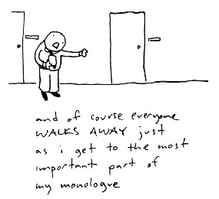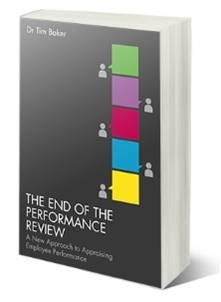I surveyed 1,400 HR managers in Australia, New Zealand and South-east Asia and the results confirmed to me the need to get rid of performance reviews.
Here are the eight problems my research unearthed about the out-of-date performance review:
Appraisals are costly

Consider this: An SME of 100 employees would devote approximately 200 hours - if done twice a year - to the interviews alone (assuming the meetings each last one hour). If you consider that two people are in these interviews, that is 400 hours of time taken up in face-to-face meetings that could be spent on other work-related activities. This doesn't take into account the preparation time. Let's assume the manager and employee takes up 30 minutes each to prepare for the interviews on average. That amounts to another hour per appraisal. With 200 appraisals that is another 200 hours. We are no up to 600 hours a year.
While the manager and employee are spending time preparing for and conducting their interviews, they are neglecting their core duties. Accountants refer to this as a opportunity cost. In this example that amounts to another 600 hours a year. So we are now consuming 1,200 hours of time a year on this appraisal exercise.
Working on the standard eight-hour working day, this means that approximately 150 person days are devoted to the exercise of appraising performance in an organization of 100 people. In dollar terms, and based upon the aggregate $65,000 wage, the average employee receives approximately $178 per day. $178 by 150 days equals $26,700.
That's a lot of money for what is - at best - a questionable return.
Appraisals can be destructive

Aside from the cost, many managers I speak to tell me that performance appraisals can cause more harm than good.
Consider a typical example: A manager neglects to give any feedback to a team member throughout the year. Come appraisal time, the manager - through necessity - lets his or her team member know that they are not happy with a particular aspect of their performance. Perhaps they do this in a tactless, destructive way. The employee is naturally blind-sided and offended by what they perceive as unwarranted criticism and a personal attack. They were not expecting this criticism and did not appreciate the way it was delivered. The recipient is unpleasantly surprised, is intimidated, or reacts negatively to what they think is unfair criticism of their work. This scenario is not uncommon.
Appraisals are often a monologue rather than a dialogue

The concept of the formal appraisal is based on a power relationship; that is, the manager has the upper hand. he or she has a greater say in the appraisal of the team member. The employee usually has a say, but it is often in response to the manager's observations. It is an appraisal, not a conversation on performance. Managers are encouraged by HR to have a conversation with each of their team members, but in reality it is an assessment of performance.
The formality of the appraisal stifles discussion

As I say, these formal performance appraisals are not really conversations; rather they are official meetings between powerful and less powerful persons reliant on hierarchical position. Under these circumstances, the potential for a productive two-way conversation is limited.
Appraisals are too infrequent

Feedback in the formal appraisal system is certainly not immediate. And why is this a problem? Well, the more immediate the feedback the more likely it is to be perceived by the employee as important in the eyes of the boss. If the feedback on a report is left until appraisal time - possibly several months later - the employee is probably thinking to themselves, or may even say: 'If this is such a big issue, why didn't you raise it with me at the time I wrote the report?' The result of this is that the delayed feedback is not always taken seriously by the employee. If the matter of a poorly written report is raised by the manager immediately after the report has been produced, the employee gets the idea that their boss sees good report-writing as a priority.
Appraisals are an exercise in form-filling

The emphasis on the conventional appraisal becomes an exercise in administration or form-filling. With pressure form the HR department, the manager becomes fixated with filling in the relevant paperwork; dialogue id devalued as a result of the administrative function of the appraisal. In other words, completing the appropriate forms becomes the central focus and therefore stifles meaningful conversation.
Appraisals are rarely followed up
Once the document and paperwork are submitted to HR, it is, more often than not, business as usual. Both the appraiser and the employee don't have to worry about the exercise again for 6 to 12 months. The consequences of this attitude is that very rarely is anything followed up between appraisals. People move on and the key points are forgotten. As a result, nothing really changes.
Most people find appraisals stressful

The focus of the 'discussion' is rarely about the constructive ways in which an employee's strengths can be utilized and weaknesses overcome. As I mentioned, it is usually viewed as a 'box-ticking' exercise that bypasses what should be the essence of the conversation, which is behaviour change. This contributes to the stress of the exercise.
So these are the eight issues that my research indicates are the potential shortcomings of the standard performance review system.
If you'd like to learn more about The Five Conversations Framework, contact Winners at Work.
Written by Dr. Tim Baker

Related content: Human spirit and work performance
.png?width=190&name=IPA%20Logo%20Transparent%20(Hi-Res).png)






